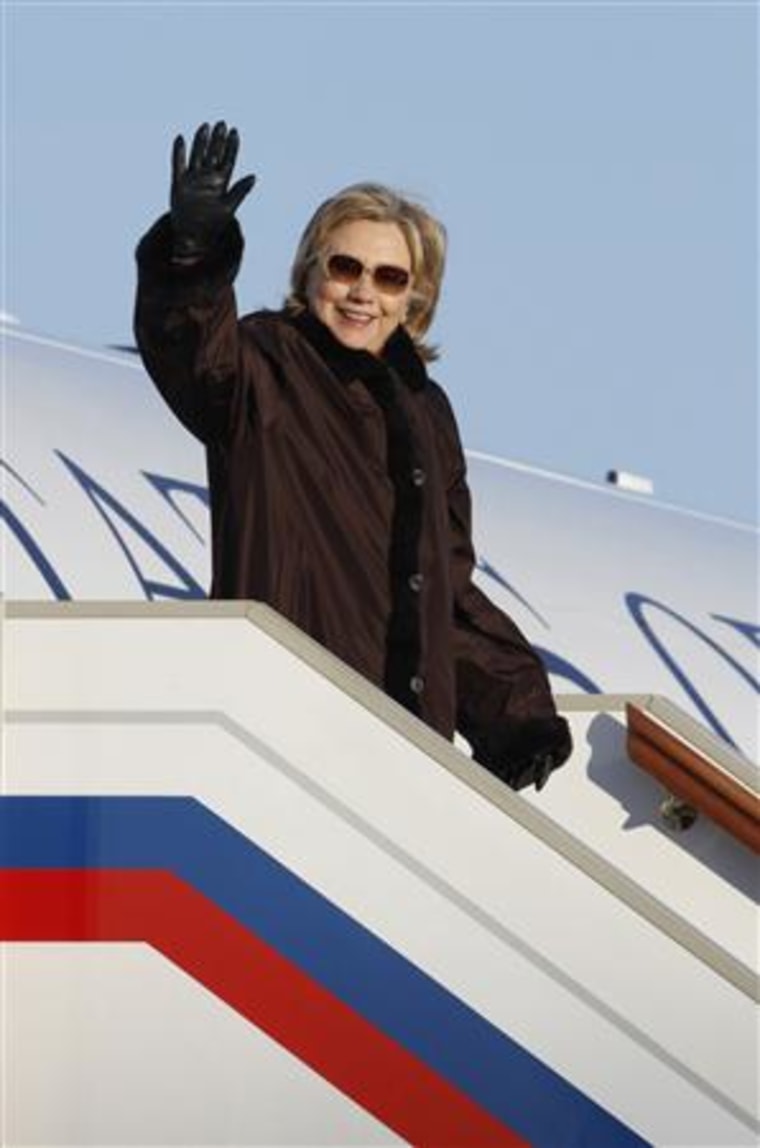The diplomatic rift between the United States and Israel appeared to widen Thursday over Prime Minister Benjamin Netanyahu's failure to call Secretary of State Hillary Clinton with an explanation of Israel's east Jerusalem building plan, U.S. sources say.
Last Friday, Clinton phoned Netanyahu to strongly criticize Israel's announcement of new Jewish housing in east Jerusalem during Vice President Joe Biden's trip to the region to promote indirect talks between Palestinians and Israelis.
Clinton requested answers from him on how Israel was planning to proceed. The State Department expected a response days ago and even announced that Netanyahu would call before Clinton left Washington at noon Wednesday for a previously scheduled trip to Russia.
However, in a sign of the fractured ties between the two governments, senior administration officials traveling on the overnight flight to Moscow with Clinton told NBC News' Andrea Mitchell that Netanyahu did not call.
Biden phoned Netanyahu Wednesday urging him to make the call, but apparently he did not persuade the Israeli premier, NBC said. Pending resolution of the latest flap, there will not be indirect talks between Israel and Palestinians led by Special Representative George Mitchell.
"As we've said, before we move ahead with further meetings, we would expect a call from Prime Minister Netanyahu. And what he tells us will inform what we do next," a senior official on Clinton's plane told NBC.
NBC's Mitchell reported that Netanyahu's refusal to explain effectively means that the Moscow meeting of the so-called "quartet" of interested parties in the Mideast peace talks — the U.S., Russia, the European Union and the U.N. — will not be able to lay out their next steps.
Netanyahu is scheduled to arrive in the United States next week for the annual meeting of AIPAC, the American pro-Israel lobbying group. He is expected to see Clinton during the trip, but not President Obama, who is scheduled to be in Indonesia.
On Wednesday Netanyahu had to apologize for remarks by his brother-in-law in a radio interview in which he described President Obama as an "anti-semite." Netanyahu said he completely rejected the remarks by his wife's brother, Hagi Ben Artzi.
Meanwhile, Israel's largely ceremonial President, former PM Shimon Peres, is trying to negotiate a compromise between the United States and Israel over the proposed housing for east Jerusalem, which would see the houses built in primarily Jewish neighborhoods that developed after the 1967 war.
Nuclear weapons talks with Russia
The row with Israel threatens to overshadow the main reasons for Clinton's meetings with the Russians: to clear obstacles to a new treaty cutting nuclear weapons arsenals and to seek Moscow's backing for tougher sanctions against Iran.
Clinton has described the rift with Israel over the Jerusalem construction project as a challenge, avoiding criticism of Tel Aviv.
On Thursday, she called for a relaunch of negotiations between Palestinians and Israelis in an effort to achieve a two-state solution. She said the U.S. is still committed to brokering a peace deal.
U.N. Secretary-General Ban Ki-moon, also in Moscow for a Friday meeting of Middle East mediators, urged Russia and the United States to sign the new arms control pact "as soon as possible" during talks with President Dmitry Medvedev.
President Barack Obama has tried to "reset" relations with Russia after a stormy period under his predecessor George W. Bush. But his administration needs results from its initiatives to counter Republican charges he is too soft on Moscow.
‘Very good progress’
Russian and U.S. teams have been negotiating for nearly a year on a successor to the 1991 START I treaty cutting the number of nuclear weapons by up to a third. Foreign Minister Sergey Lavrov said Tuesday that they could have a deal ready for signing by early April.
"We are making very good progress. I can't predict to you exactly when the agreement will be completed but ... we are getting closer," Undersecretary of State William Burns told reporters as Clinton flew to Moscow.
Shortly before Clinton was to meet with Lavrov on Thursday, Russian Foreign Ministry spokesman Andrei Nesterenko said the arms pact was almost complete.
"Most, practically all of the fundamental part (of the treaty) is already agreed," Nesterenko told reporters.
He said negotiators were resolving "specific technical issues", largely involving a hefty annex to the agreement and questions of translation.
Medvedev and Obama pledged last year to cut each nation's deployed nuclear warheads to between 1,500 and 1,675 but trust between the two former Cold War foes remains elusive.
World powers hope to stem the spread of atomic weapons and rein in the ambitions of nations such as Iran and North Korea.
The United States also hopes to win Moscow's backing for tougher sanctions against Iran over its nuclear program, which the West suspects is intended to produce atomic weapons. Iran denies this.
Medvedev earlier this month promised support for "smart" sanctions against Tehran which are not aimed at civilians, but Moscow has long been reluctant to agree to punitive measures against a traditional ally and trading partner.
